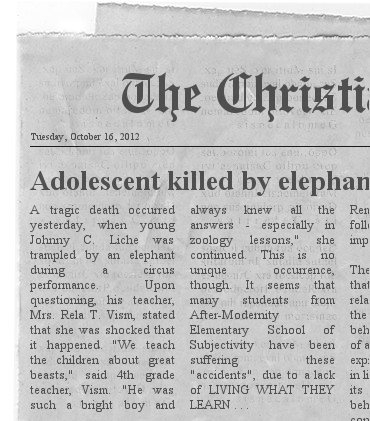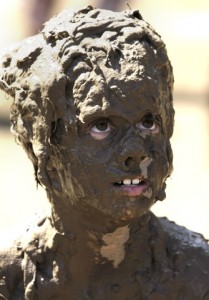One as Another
“Adolescent killed by elephant in tragic misunderstanding”, claims newpaper, The Christian Appropriator
 The headline story of The Christian Appropriator began,
The headline story of The Christian Appropriator began,
A tragic death occurred yesterday, when young Johnny C. Liche was trampled by an elephant during a circus performance. Upon questioning, his teacher, Mrs. Rela T. Vism, stated that she was shocked that it happened. “We teach the children about great beasts,” said 4th grade teacher, Vism. “He was such a bright boy and always knew all the answers – especially in zoology lessons,” she continued. This is no unique occurrence, though. It seems that many students from After-Modernity Elementary School of Subjectivity have been suffering these “accidents”, due to a lack of LIVING WHAT THEY LEARN . . .
The article went on to explain that some methods of education lack the ability to appropriate what has been learned. Appropriation could be defined as,
from L. appropriationem (nom. appropriatio) “a making one’s own,”specifically regarding education – to take knowledge and apply it to actual living.
Some children know about fire, yet think they won’t get burned; know about ethics, but cheat without remorse; learn about the size and nature of elephants, yet stand below a bull during a dangerous performance – these are the results of taking things that are true and treating them as mere possibility. It is the motto of the After-Modernity Elementary School of Subjectivity, or (AMESS), to imbue such compartmentalization:
Learning that Truth is what You make it
The Christian Appropriator continues,
This is an issue on all fronts of life, Christianity not being immune. It is not uncommon for people to “know” something as true, yet not live it out. In fact, the knowledge, for some, proves to most often be empty at best and false at worst. The Fathers understood the difference between Knowledge, Understanding and Belief (latin, notitia, assensus, fidicia). It is only when one believes (fiducia) a something as True (a capital “T” being Objective Truth), will one apply it to their lives. Many would deny the existence of such objective truth, yet ironically “believe” that statement to be absolutely true. Everyone believes, it’s just some believe the elephant is a fact only in the story and others find the truth in the sound of his trumpet and the pound of his footstep. They need not be mutually exclusive, the information and the thing. It is just that the information must always point to the thing – AND THE THING IS THE POINT, NOT THE SOUNDS AND SYMBOLS ABOUT THE THING . . . NOT JUST THE LANGUAGE. This is where Anselm, Descartes and even Aquinas helped us a bit in their discussions of ontology – namely that something can be shown to exists because we can conceive of it in our minds. They apply this mainly to God and His existence. One might argue that could mean that because a little girl could draw a pink, panda with purple polka dots, dancing with monkey on a high-wire made of noodles, over a sea filled with mermaids that such things exist. This takes the argument further than it intends. It would merely prove that pandas, monkeys, colors, fishtails, women, oceans, dance positions and noodles exist. The unusual and unrealistic in the painting is just a combination of reality, otherwise the child could not conceive of them in their mind.
Truth is definitive, not relative. We are not to define it, rather discover it before “the shoe drops.”
By the way, the article above is not actual, but the point is. 😉
Discipleship 3.1 – The Method
 Whenever we encounter elemental, or core theological principles, we often feel as though a tsunami-like wave has crashed over us – because we just want to know:
Whenever we encounter elemental, or core theological principles, we often feel as though a tsunami-like wave has crashed over us – because we just want to know:
1. What do we do?
2. (and maybe more forefront in our minds) How do we do it?
Now, there is a danger crouching behind these questions, but I will deal with that in 3.2.
So far we have seen that we have been given a Mission and such an imperative has the implied call to obey it. I suppose it isn’t too cliche to say that God doesn’t make suggestions. This should be delightfully obeyed, because it should find an immediate harmonious connection within our own desires, thus given us a very organic internal Motivation – namely, that we are Christians who love Jesus and we want others to love Him too. If you have trouble agreeing with the first two points in this paragraph and series, then you may not know Him, even likely so. If that is the case, go here.
So, to answer the first question, we are to make disciples of Jesus Christ. This must never be eclipsed by men, fellowships, denominations, traditions nor religion.
We DO NOT make disciples of ourselves.
We DO NOT make disciples of (human) leaders.
We DO NOT make disciples of our local fellowships (churches).
We DO NOT make disciples of a denomination.
We DO NOT make disciples of a particular school of thought.
We DO NOT make disciples of Christianity.
Discipleship – 1: The Mission
What if we were given one thing to do – just one main mission – and we didn’t do it? Now, this does not imply that this one thing is an all encompassing definition of our lives and all of the reality adjacent to our lives – but, it is the one thing – the main thing we are to do. I guess it would depend upon who gave us the mission and what was at stake . . . right?
When reading Acts 14, specifically Acts 14:21-28, I see an interesting, rather arresting pattern. The text says that Paul “made many disciples . . . strengthened the souls of the disciples . . . and spent a long time (not a little time) with the disciples.” This is a profound narrative. Paul could have, according to some – should have, kept working “for the faith”, since all of these people were already converts. Yet, he spent precious time encouraging and building up the Church and he spent large amounts of that time. Why? Why would he do that?
An analogy of sin and Christ
 When I was a boy, we lived in a rural part of Alabama. We had a creek behind our home and it had countless joys for young boys in it: crawdads (crawfish), cool rocks, snakes, water and mud – lot’s of mud. We spent a many a summer day in that creek and in the evening, as we were being called in for dinner a common scene took place:
When I was a boy, we lived in a rural part of Alabama. We had a creek behind our home and it had countless joys for young boys in it: crawdads (crawfish), cool rocks, snakes, water and mud – lot’s of mud. We spent a many a summer day in that creek and in the evening, as we were being called in for dinner a common scene took place:
Rob approaches the sliding-glass door at the rear of the house bearing the filthy joy of creek-playing hedonism
Dad: “Stop right there! You are not setting foot in this house until you clean up.”
Rob starts to attempt wiping off the mud – only there is mud on his hands and on every part of his body. Only smearing and deeper staining is occurring.
Dad: furrowed-brow looks
Rob: “This isn’t working.”
What Rob needs is an outside source – something clean that can take the filth from him. Rob needs a clean towel and his brother to spray him with a water hose. Without a clean source to take the stains away, there is no hope.
Truly on this side of the analogy AND the sliding glass doors, the fried chicken has never tasted so good.
Thank you, Jesus.
Rich churches, camels and such (redux)
I have been thinking a lot lately how grossly rich our churches are here in America – and how we are ok with that. We are driven to the next novelty and the next programmatic push, simply because we can. We have redeemed our tickets at Pleasure Island and we do not even know what we have made of ourselves – mainly because most everyone else looks just like us.
We want.
That is the nature of us – we want.
more lights
more electronics
more leather
more space
more numbers
more control
more praise
more me
I am reminded that Jesus said, “For it is easier for a camel to go through the eye of a needle than for a rich man to enter the kingdom of God.”
Then, I wonder about a whole caravan of them . . . Read the rest of this entry »